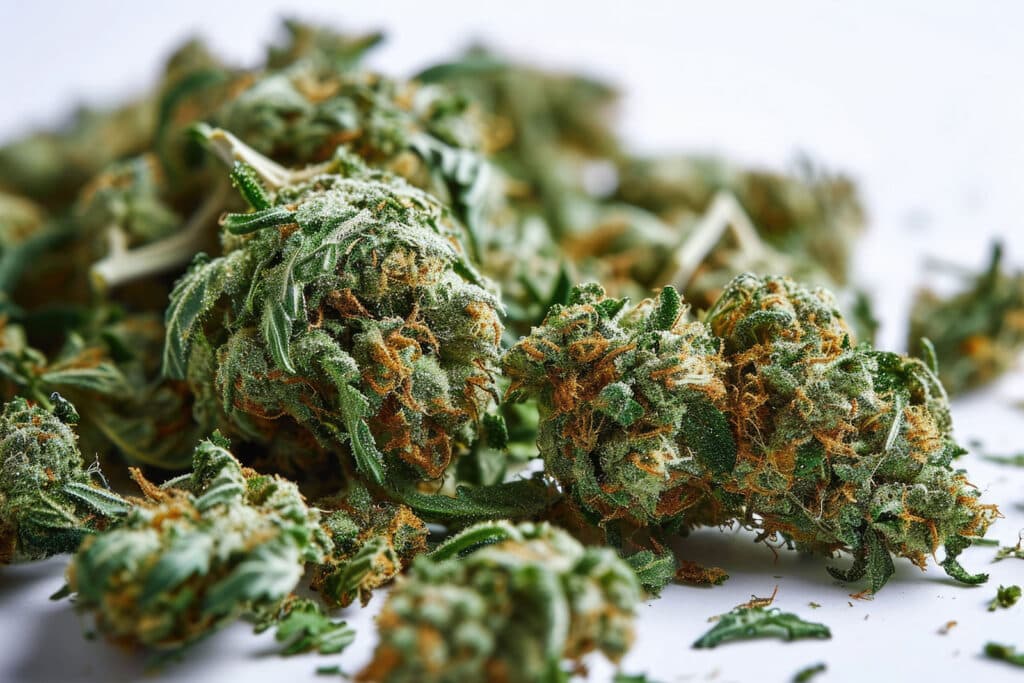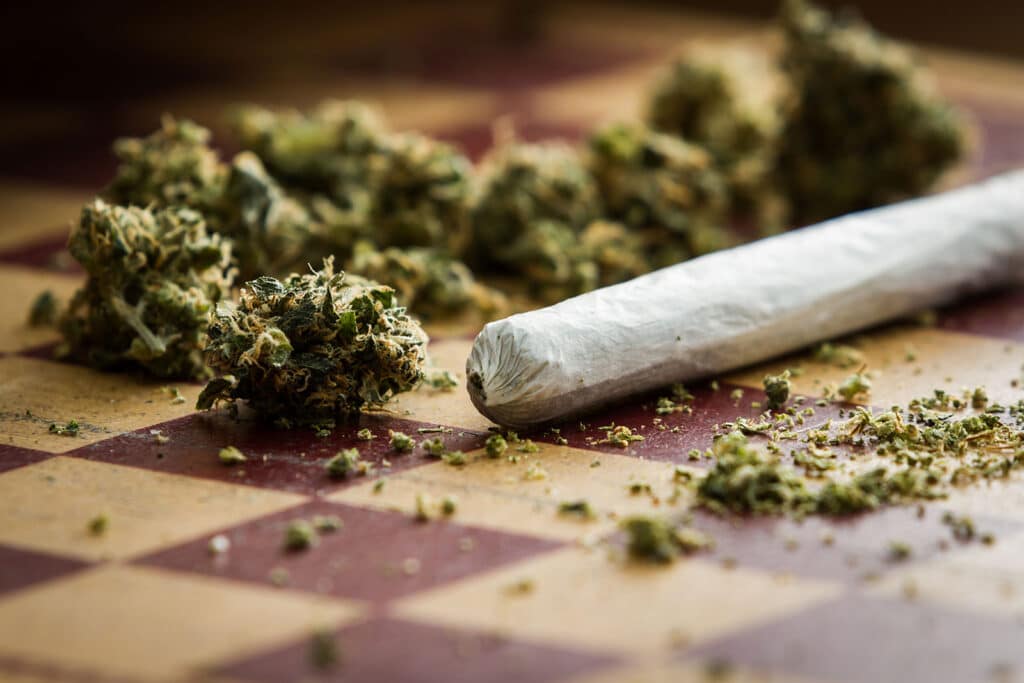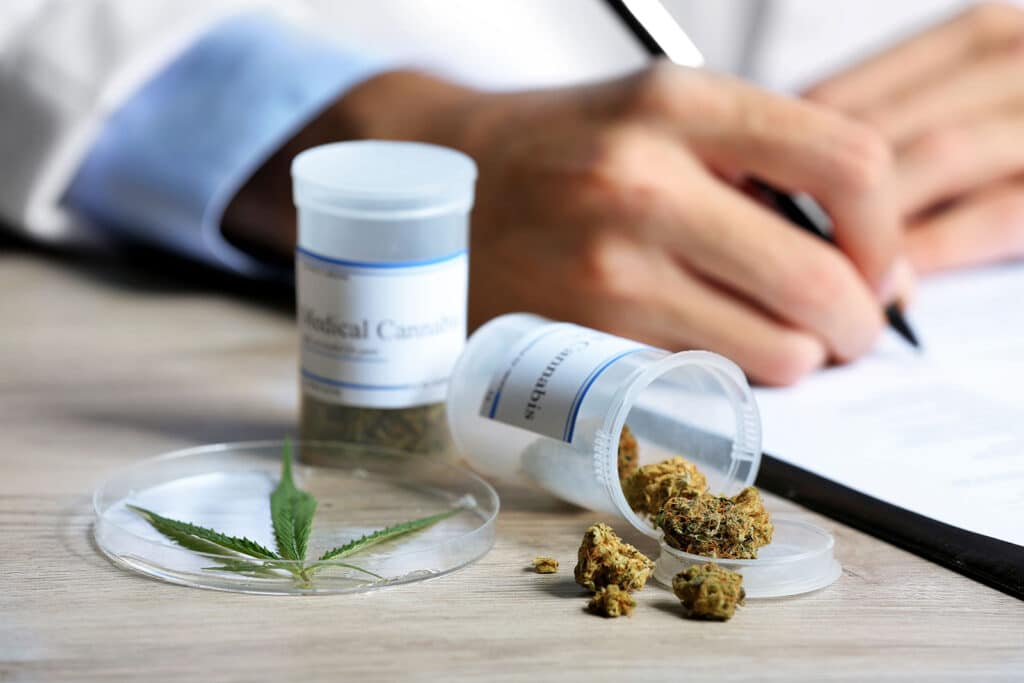The term “loud weed” may be new to the ears of many, as it’s not one of the common marijuana-related words.
It’s a slang term that describes a certain type of high-quality, potent weed.
But what makes this variety of marijuana more dangerous than others, and what are its side effects?
In this article, we’ll break down everything about loud weed and its potential risks as well as how to treat addiction to it.
Table of Contents
- 1 What Is Loud Weed?
- 2 Why Is Loud Weed So Potent?
- 3 Side Effects of Loud Weed
- 4 Fatal Side Effects of Loud Weed
- 5 Is Loud Weed Addictive?
- 6 Is It Possible to Overdose on Loud Weed?
- 7 How to Tell If Someone Is Suffering from Cannabis Use Disorder
- 8 How to Treat Marijuana Use Disorder in New Jersey
- 9 Ready to Break Marijuana Addiction Chains?
What Is Loud Weed?
Cannabis strains can be categorized according to their quality into three categories: “loud,” “beasters,” and “reggies.”

Loud weed refers to the type of cannabis that has the highest quality and produces the most powerful aroma, pungency, and side effects.
This type of weed is a hybrid strain that produces talkative, giggly, and sleepy effects. It has special terpenes that give it a citrus and pineapple-like smell and a herby taste.
The term “loud” refers specifically to the substance’s strong taste and intense aroma. There are multiple types of loud weed, such as loud scout and loud dream.
The origin of this marijuana variety is a bit mysterious, but there are some claims that it comes from Atlanta, Georgia.
But how does loud weed compare to other varieties? Let’s take a look:
In the second place in terms of quality comes the “beasters” weed that emerges from Canada.
It has a high concentration of tetrahydrocannabinol (THC), ranging between 15% and 20%. It also might contain a small portion of stems and seeds.
At the bottom of the quality spectrum comes “reggies” weed also known as brick weed. It’s a brown and dark green weed that contains a considerable amount of seeds and stems.
Why Is Loud Weed So Potent?
The purity and unparalleled quality of loud weed make it one of the most powerful marijuana varieties in the market. It has a remarkably high content of THC which can reach up to 26%.
Manufacturers produce loud weed from multiple kinds of strains grown under special conditions.
These strains are picked meticulously through selective breeding of cannabis plants to produce the highest THC-containing varieties. This is why it’s sold for several hundreds of dollars per ounce.
Side Effects of Loud Weed
The adverse effects of loud weed are highly similar to those of most other types of marijuana.
However, its high potency makes the side effects more severe compared to the other marijuana types.

Given that, here are the most common adverse effects of consuming loud marijuana:
- Intensified sensory perception
- Deep relaxation
- Euphoria
- Hallucinations
- Paranoia
- Panic attacks
- Psychosis
- Mood swings
- Bloodshot eyes
- Increased appetite
- Altered perception of time
- Slow reactions
- Inability to balance one’s body
- Falling
- Increased heart rate
- Impaired judgment
- Dizziness
Fatal Side Effects of Loud Weed
Loud weed might cause a few rare life-threatening short-term and long-term effects.
The high concentration of THC in this marijuana variety increases the likelihood of experiencing a heart attack. It can also exacerbate the health condition of people with schizophrenia or bipolar disorder.
Worse still, its impact on increasing blood pressure may threaten the lives of people suffering from cardiovascular issues.
Not to mention that loud weed can cause mental illness, chronic cough, memory problems, and increased phlegm production with long-term use.
Is Loud Weed Addictive?
There’s a decent possibility of developing an addiction to marijuana for users of all ages., However, adolescents are the most vulnerable to cannabis dependence.

Statistically speaking, over 30% of Americans who use weed have a cannabis use disorder according to the CDC.
The reason is that marijuana’s main cannabinoid compounds, THC and CBD (cannabidiol), impact the reward system of the brain, causing continuous cravings for the substance.
The bad news is that abuse potential becomes much higher when consuming weed varieties with high THC levels, such as loud weed.
These powerful cannabis variations produce more intense “highs.” The brain quickly adapts to these “highs”, driving the user to increase the dose to achieve the same effect.
Is It Possible to Overdose on Loud Weed?
Unfortunately, the possibility of a loud weed overdose is much higher than that of other lower-quality cannabis.
This can happen whether you ingest the loud weed by smoking, vaping, or as edibles. The symptoms of overdosing on the substance include the following:
- Paranoia
- Shaking
- Extreme hallucinations
- Severe distress
- Dangerous behavior that might harm the person or the people around them
How to Tell If Someone Is Suffering from Cannabis Use Disorder
To determine if someone is experiencing a marijuana addiction, the person should show two or more of the eleven symptoms defined by the DSM-5.
They must manifest these signs for around 12 months. The more symptoms a person shows, the more severe their condition is.
Given that, the following are the addiction signs to look for:
- Losing control over marijuana consumption, using it in higher doses and for longer periods than intended.
- Experiencing continuous high cravings for cannabis.
- Encountering a lot of problems in relationships because of the negative effects of cannabis.
- Having a hard time meeting the simplest responsibilities of work, school, and home.
- Absence from social, work, and recreational activities that cannabis users used to participate in.
- Inability to quit weed smoking or consuming it less frequently despite the desire to do so.
- Experiencing a variety of withdrawals when reducing or stopping the use of marijuana.
- Inability to stop using the drug despite its negative psychological and physical effects.
- Spending a pretty penny and considerable time using marijuana or trying to recover from it.
- Increasing the dose of cannabis over time.
- Using marijuana in situations where using it can risk the life of the person, such as when driving.

How to Treat Marijuana Use Disorder in New Jersey
You can choose between a variety of marijuana addiction treatment options in New Jersey. However, effective treatment options should include the following procedures:
Medically-Assisted Detox
People with cannabis dependence will suffer from withdrawal symptoms varying in severity when quitting the drug. Many people can’t tolerate most of these symptoms.
That’s why the safest approach to detox from marijuana is to undergo medically-assisted detoxification.
Medical professionals will help you handle the withdrawals using the appropriate medications or even behavioral techniques.
Better still, medically supervised detox addresses co-occurring disorders and any underlying mental health issues related to the addiction.
Behavioral Therapy
Making behavioral changes is an integral part of any effective addiction treatment program. Professionals use cognitive behavior therapy to help patients achieve these adjustments.
This therapy type teaches patients to control attitudes and behavior.
In addition, it helps patients to handle stress and personal problems to avoid using drugs in the future.
Besides these procedures, a healthcare provider might suggest more treatment methods, such as attending support groups and taking part in holistic or family therapy sessions.

Ready to Break Marijuana Addiction Chains?
Although it seems complicated, achieving full recovery from marijuana addiction is easier than you think with the right guidance and medical supervision.
Garden State Treatment Center is here to give you a hand. Our medical team will provide you with a personalized addiction treatment plan based on your needs and health condition. They’ll also guide you step-by-step until you achieve sobriety.
Contact us now and let’s write your new, better chapter in life.
References
- https://www.webmd.com/vitamins/ai/ingredientmono-1690/delta-9-tetrahydrocannabinol-thc
- https://www.webmd.com/mental-health/addiction/marijuana-use-and-its-effects’
- https://www.cdc.gov/cannabis/data-research/facts-stats/?CDC_AAref_Val=https://www.cdc.gov/marijuana/data-statistics.htm
- https://edition.cnn.com/2022/07/25/health/marijuana-potency-addiction-study-wellness/index.html
- https://www.psychiatry.org/psychiatrists/practice/dsm
Published on: 2024-06-11
Updated on: 2025-05-02



